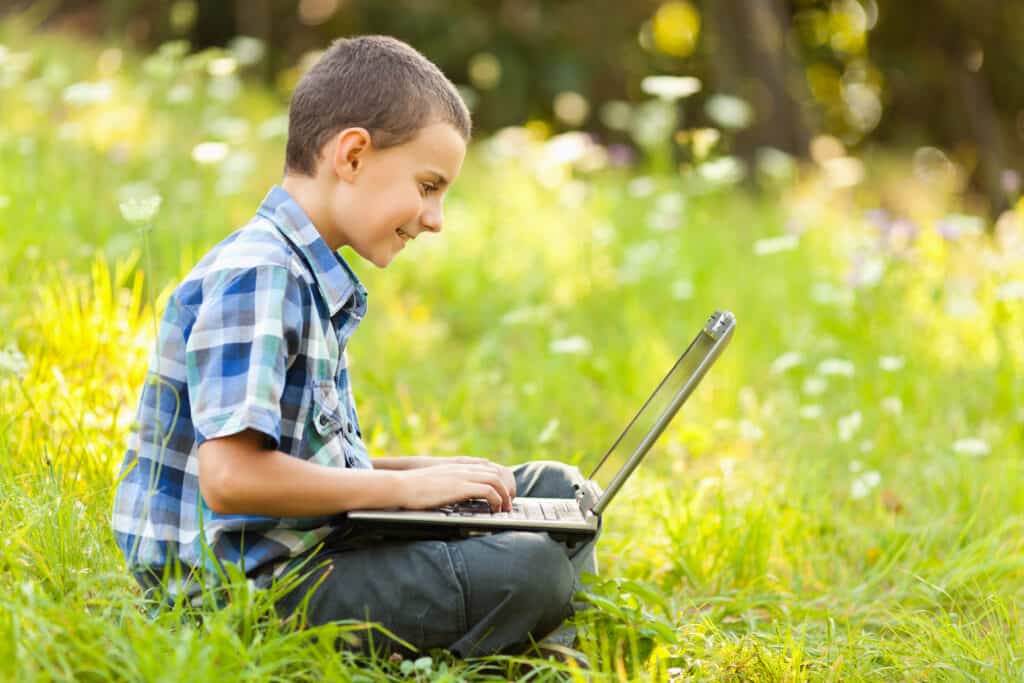Unschooling: Natural Learning for Homeschool
Kids are naturally curious. While many educational approaches are centered around telling kids what to learn next, unschooling is a mindset that celebrates this natural curiosity first and foremost. Unlike other methods, unschooling isn’t exactly a defined approach to learning and teaching. So, you may be wondering, what is unschooling, and how is unschool different from homeschool? In this article, we’ll break down this powerful approach to childhood growth and learning.
What Is the Unschooling Homeschool Method?
Firstly, unschooling isn’t really a homeschool style. It’s more accurate to say that it’s a way of thinking about children, the way they learn, and the importance of their educational experiences. In the early years of life, children grow and develop at a rapid rate, driven by fundamental curiosity and a desire to interact with their world. The unschooling method is essentially the belief that this natural, experiential learning should drive a child’s entire education.
So, what is unschooling? There is more than one answer to that question, so we’re going to start with what unschooling isn’t. It isn’t:
- A formulaic approach to teaching and learning
- A set of steps that can be carefully followed to achieve maximum learning
- A highly standardized or formulaic methodology
As a result, every family that unschools their children will likely have a different experience. Unschooling involves enabling children to learn about and pursue their own interests, passions, and curiosities without limiting them to topics that fit into tidy subject labels, like math or science. And yet that doesn’t mean that unschooled children never receive a lesson, and it doesn’t mean that they “fall behind” their peers in what we would consider to be typical academic subjects. It simply means that they engage with these topics in a more organic way.
Interest-Driven Learning
Imagine a child that develops a deep interest in dinosaurs. Think about all the places this can take their learning! Of course, they may end up learning about paleontology, the science of carbon dating, the connections between dinosaurs and modern animals, and even the geological processes of the Earth. They may also expand their own reading skills by looking up new words in a dictionary or thesaurus and challenge themselves to understand rigorous texts. Then, they may explore how fossils were interpreted by different cultures over our world’s history. They may even need to learn about money to pay the entrance fee for a local museum’s dinosaur exhibition.
A traditional approach might sort these activities into subjects like science and language arts, but unschooling doesn’t rely on these formal distinctions. At the same time, unschooling isn’t a completely self-directed method, either. If your student is curious about a topic like counting money, you might show them the different denominations of coins and how to count them. However, you’d be doing this because their interest led you to it — not because it’s day 63, and that’s what the table of contents says comes next. Unschooling encourages students to follow their fascinations, and as a result, it helps them see the interconnectedness between their learning and the world around them. It may not look like a traditional education, but that doesn’t mean it isn’t deeply educational.
Unschooling vs. Homeschooling
Homeschooling is a broad umbrella category for at-home learning. There are many different structures and approaches that families who homeschool their children might use, like Roadschooling or Montessori. These homeschool styles essentially give families a set of guidelines to work with, like how to approach certain topics or how to structure their homeschooling day.
Unlike these other methods, unschooling isn’t a defined homeschool style. Instead, it’s a way of thinking about your approach to homeschooling as a whole. Some families may find that a blend between an unschool-inspired approach and another homeschool style works best for them. Ultimately, that freedom and flexibility is part of the beauty of homeschooling!

The Pros and Cons of Unschooling
Some parents have concerns about the unconventional approaches that unschooling lends itself to. After all, it’s true that this philosophy doesn’t look much like other homeschool methods — in fact, that’s the point! You might be wondering, are unschooled kids successful in academics and later on in life? The short answer is a resounding yes!
Unschooling has been linked to a huge number of benefits for students, including stronger academic performance and more positive attitudes about learning. Unschooled children also demonstrate better social-emotional wellbeing and a deeper sense of connectedness to their family. In fact, unschooling can benefit the entire family by reducing the stress of homeschooling and by encouraging families to spend meaningful, enriching time together.
Of course, every approach to homeschooling has its ups and downs. Since unschooling is exclusively interest-driven, there is the possibility that an unschooled student will wind up with some gaps in the information they learn. This can become a challenge down the road when the student is preparing for college or a career. It can also be time-consuming for parents to keep up with, as unschooling may involve a great deal of flexibility, exploration, experiential learning, and customization to meet the needs of each child.
Is Unschooling Right for My Child?
Unschooling can be a powerful approach to a child’s education. However, like all homeschool styles, it may be the perfect fit for some families and may not work as well for others. If you’re considering unschooling, start by asking yourself these questions:
What Are Your Child’s Unique Needs?
Unschooling can help meet the diverse needs of many different students. Highly introverted students or students who struggle with anxiety provoked by the traditional schooling environment may thrive with an unschooling approach. Similarly, students with learning exceptionalities, including those who are gifted and/or on the autism spectrum, may love how unschooling enables them to explore their interests and passions in depth. On the other hand, some students may do better with more structure and guidance in their homeschool routine. Consider your child’s unique needs when deciding if unschooling might be the right fit for your family.
Is Unschooling Feasible For Your Family?
Even if unschooling sounds like a great approach for your kids, it may not be feasible for every family. Think about factors like…
- The number of kids you’d be unschooling at once
- Your budget for supplemental and exploratory educational activities
- The availability of adults/parents throughout the day to support your student
Since unschooling is so open-ended, it might be a harder approach to take for a large family of homeschooled students. Additionally, unschooling can be time-consuming for involved parents and guardians. This might make it a challenging approach for some families, while its inherent flexibility may make it perfect for the scheduling needs of another. Be sure to think about what unschooling would really look like for your family when deciding if it’s the right approach.
What Motivates Your Child?
Is your child feeling bogged down or lacking in motivation from the traditional schooling environment? Alternatively, are they deeply self-motivated to learn about the things that fascinate them? Unschooling can help many students rediscover the spark that makes learning so rewarding and exciting.
How Will Your Child Socialize With Their Peers?
Of course, socialization is perhaps the most common concern about any homeschool method. The individualized nature of unschooling does mean that it typically relies on independent learning over homeschool co-ops or extracurricular classes, so try to consider how else your student will have the chance to make friends and socialize. Can they join a club, a sporting league, or even a volunteer organization? All of these activities provide great opportunities to spend time with their peers and may even help them discover a new passion to explore while unschooling!
How to Unschool
Since unschooling isn’t a specified program or method, there isn’t a step-by-step guide to follow to start using this powerful approach with your child. However, you can start by checking your state and local homeschool laws to ensure an unschooling approach will be in compliance with all the regulations you need to meet. Unschooling is legal in all 50 states, but you’ll most likely need to keep track of some things, like your student’s attendance and subjects of study.
Once you’ve got these basics down, unschooling is mostly about letting your student take the lead! Try to…
- Provide encouragement often and enthusiastically
- Allow them to engage in a productive struggle whenever possible
- Remember that you can (and should!) guide your student’s learning when they express interest in a topic or skill
- Look for opportunities in the world and community around you to deepen their learning
- Have fun with the freedom and flexibility that unschooling provides!
Unschooling with Miacademy
As your student dives into learning through unschooling, you may need some resources to support them. After all, an unschooled student might…
- Learn algebra to code a new video game
- Explore geography to understand the challenges of circumnavigating the globe
- Practice Spanish to read original historical texts
With unschooling, the possibilities are truly endless — but what if you’re not a master of algebra, geography, or Spanish? With Miacademy, you’ll always be ready to support your student, no matter where their learning takes them!
While our site can be used as a formal curriculum, it can also be a powerful educational supplement for interest-driven learning. Our online lessons are flexible, and you can completely customize your student’s assignments. With just a few clicks, you can assign focused lessons that support the topics they’re exploring now or simply give them access to our complete collection of educational videos, games, and extension activities! That way, your student will always be ready to follow their fascination into learning.
The Miacademy Community
Our social features can help your student stay in touch with their peers even as they learn and explore independently. Miacademy students can…
- Customize their profile
- Interact with other students
- Play educational games
- Run a digital business
- Create and share videos
These social features are all completely moderated by real people. That means you can rest assured that your child will be staying safe while learning online. Like the rest of our site, our social features are customizable, so you can turn them on or off for your student any time.
Curious about how Miacademy or our high school site MiaPrep can support an unschooling approach to learning at home? Contact our friendly customer support team any time. We’d be happy to help you find out how Miacademy can become a part of your unschooling adventure!

